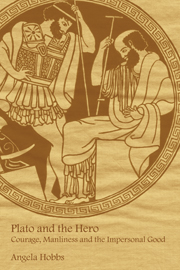Book contents
- Frontmatter
- Contents
- Acknowledgements
- Preface
- Glossary
- 1 The puzzle of Plato's thumos
- 2 Thumos, andreia and the ethics of flourishing
- 3 Arms and the man: andreia in the Laches
- 4 Odd virtue out: courage and goodness in the Protagoras
- 5 Why should I be good? Callicles, Thrasymachus and the egoist challenge
- 6 Heroes and role models: the Apology, Hippias Major and Hippias Minor
- 7 The threat of Achilles
- 8 Plato's response: the valuable as one
- 9 Alcibiades' revenge: thumos in the Symposium
- Epilogue: The weaver's art: andreia in the Politicus and Laws
- Bibliography
- Index
3 - Arms and the man: andreia in the Laches
Published online by Cambridge University Press: 01 October 2009
- Frontmatter
- Contents
- Acknowledgements
- Preface
- Glossary
- 1 The puzzle of Plato's thumos
- 2 Thumos, andreia and the ethics of flourishing
- 3 Arms and the man: andreia in the Laches
- 4 Odd virtue out: courage and goodness in the Protagoras
- 5 Why should I be good? Callicles, Thrasymachus and the egoist challenge
- 6 Heroes and role models: the Apology, Hippias Major and Hippias Minor
- 7 The threat of Achilles
- 8 Plato's response: the valuable as one
- 9 Alcibiades' revenge: thumos in the Symposium
- Epilogue: The weaver's art: andreia in the Politicus and Laws
- Bibliography
- Index
Summary
TRAINING MEN
As we saw in chapter 2, the Laches is one of the clearest examples of Plato's belief that ethical enquiry should begin from questions of how to live and what sort of person to be. Two worthy but undistinguished Athenian gentlemen, Lysimachus and Melesias, are worried about the best way to educate their sons: their own education was neglected by their famous fathers, and they do not want to repeat the mistake. In particular, they cannot decide whether the boys should be taught the controversial new technique of fighting in armour, and they have invited two Athenian generals, Laches and Nicias, to watch a display with them and give their advice. Lysimachus and Melesias wish their sons to become aristoi, excellent and successful men: will learning to fight in armour promote this?
Before considering Nicias' and Laches' answers, it is worth noting a further way in which the opening scene accords with the suggested framework of an ethics of virtue and flourishing. This concerns general pedagogic method. All four characters take it for granted that becoming an aristos depends on the cultivation of the right studies and practices: it is the result of years of careful training. To be fully effective, however, such studies should not be viewed in isolation, but should be seen as forming part of an entire character and way of life. For the natural way to learn good practices is to reflect on and associate with those who already embody them.
- Type
- Chapter
- Information
- Plato and the HeroCourage, Manliness and the Impersonal Good, pp. 76 - 112Publisher: Cambridge University PressPrint publication year: 2000



